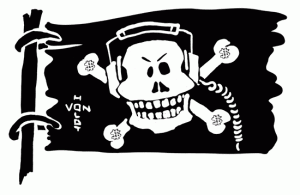I have often wondered how many jobs “unlicensed” media produce, be it P2P file sharing sites or pirate radio stations. A new study commissioned by the National Association of Broadcasters inspires me to attempt a rough cut of the pirate radio question. Based on my guesstimate study, broadly modeled on its methodology, I think that pirate radio stations in the United States annually generate 19,220 jobs worth $576,600,000 to American workers. That’s more than a half a billion dollar yearly boost to the US economy.
The NAB backed report says 2.52 million jobs are “attributable” to the local commercial radio and television industry on an annual basis. The study was produced by the Woods and Poole economic research group.
Here is the gist of the study’s methodology and findings:
First, the direct impact of the industry is the result of its significant size: 1,370 commercial television stations and more than 11,700 commercial radio stations sustaining more than 300 thousand jobs and more than $49 billion in output.
Second, as with any industry in a developed economy, workers in the commercial local broadcast television and radio industry consume goods and services in all other sectors of the economy supporting more jobs and creating more income and output. This ripple effect is estimated to result in 833 thousand jobs and $135 billion in output.
Third, the output of commercial local broadcast television and radio industry stimulates economic activity by providing a forum for advertising that is free to consumers. The stimulative effect of advertising on local commercial broadcasts is very significant. An estimated $986 billion in United States output and 1.38 million jobs are attributable to the stimulative effects of advertising on local television and radio.
Ok. You get the idea. Direct jobs. Supporting jobs. Stimulative effect. Let’s apply this to the pirates.
Direct jobs
I estimate that there are 450 pirate radio stations in the United States. How do I get this? Wikipedia lists about 45 pirate stations. After years of following the unlicensed station phenomenon, my sense is that these lists should always be multiplied by a factor of ten, given the frequency with which pirate stations clandestinely launch.
Many pirate stations run on volunteer power. But not a few, such as recently prosecuted Daz Hits radio, have strong roots in their communities. They run income generating community events and sometimes air commercials. Thus these stations employ paid deejays, managers, event managers, food service workers, entertainers, and engineers. Thus I estimate that on average, your pirate radio station employs eight people in full or part time positions. That’s 3,600 direct jobs.
Indirect jobs
In addition, pirate stations buy and maintain radio station related equipment (from transmitters through computers) consume utilities such as electricity, water, and ISP/telecom access, and rent space. Volunteers must use public transportation to reach the station. They must buy some of their music to broadcast. They must hire t-shirt makers and other publicity related vendors. They must hire webmasters and network ISP people to stream.
Equipment acquisition, maintenance and repair: 3 jobs per station x 450 = 1,350 jobs
Utilities: 2 jobs per station x 450 = 900 jobs
Space rental (keeping landlords employed): 1 job per station = 450 jobs
Publicists: 2 jobs per station = 900 jobs
Commercial music sellers: 2 jobs per station = 900 jobs
Web/network related: 2 jobs per station = 900 jobs
Then there are the legal costs related to running a pirate radio station.
FCC anti-piracy enforcement bureau: 20 jobs
Commercial station engineers and consultants who monitor, complain about, and report pirate stations: 100 jobs
Attorneys who assist fined stations: 200 jobs
Stimulative jobs
These are the jobs that are stimulated by the music and public affairs activities of pirate radio stations. These include the income (aka jobs) that accrue to musicians, clubs, bookstores, community organizations, political groups, restaurants, digital and analog music sellers, and other entities as a result of the constant publicity they receive from the pirate station.
musicians: 4 jobs x 450 stations = 1800 jobs
clubs: 2 x 450 = 900 jobs
bookstores: 2 x 450 = 900 jobs
community organizations: 1 x 450 = 450 jobs
political groups: 2 x 450 = 900 jobs
restaurants: 3 x 450 = 1350 jobs
digital and analog music sellers: 3 x 450 = 1350 jobs
other individuals and entities: 5 x 450 = 2250
Some of these jobs, such as the FCC enforcement bureau jobs, engineering jobs, and legal cost related jobs, pay quite a lot. Many pay less. I estimate that the mean (average) income related to these jobs comes to $30,000 a year. Thus:
19,220 jobs x $30k income = $576,600,000
I think that this is a conservative guesstimate of the job value that pirate radio stations bring to the US economy. Feel free to correct my arithmetic. If you think that my methodology is off, fine. But this logic isn’t terribly different from that used in your typical trade association commissioned industry job estimate study. The biggest difference is that I did this one in about an hour and received no consulting fee for my work. You’re welcome.



